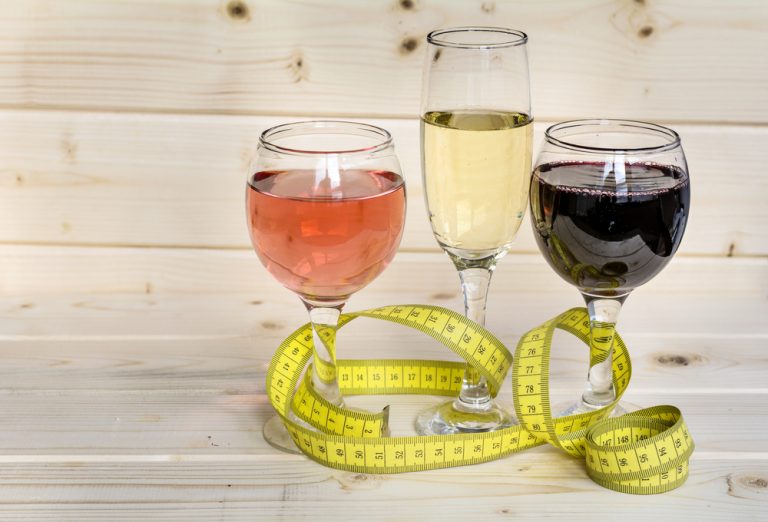The relationship between drinking alcohol and gaining weight has long been known. The complex mechanism of this phenomenon results not only from the calorific value of the alcohol itself but also from its specific metabolism and wrong decisions usually made in a state of being drunk. Excessive alcohol consumption is very often associated with overeating, the consumption of unhealthy foods and a feeling of lack of energy and a desire to exercise. It is worth considering how to drink alcohol sensibly, without harming your health and appearance.
Correlations between drinking alcohol and gaining weight
Alcohol makes you fat because it contains calories. The calories in alcohol depend on its type. One gram of alcohol provides as much as 7 kcal or more than one gram of protein. The energy coming from alcohol can be called empty calories, without additional nutritional value for the body, it is deprived of vitamins and micronutrients.
Calories in alcohol
The body metabolises alcohol in the first place, which temporarily reduces its ability to break down fats, proteins or carbohydrates, thus promoting their storage.
A glass of wine is as calorific as a piece of chocolate or cake. A person who consumes alcohol in a common manner provides the body with about additional 2000 kcal per month.
The calorific value of alcohol
The calorific value of alcohol depends on its type, as well as additional ingredients used in the preparation of drinks or cocktails.
How many calories does the wine have
A glass of alcohol contains about:
- white table wine - 84 kcal
- red table wine - 88 kcal
- Riesling - 90 kcal
- Merlot - 95 kcal
- champagne - 96 kcal
- chianti - 100 kcal
- white table wine - 84 kcal
What is the calorific value of beer and cider?
The number of calories in 350 ml is:
- non-alcoholic beer - 88 kcal
- cider - 109-160 kcal
- beer with an alcohol content of up to 5.0%. - 145-150 kcal
- strong beer over 8% alcohol - 198 kcal.
- non-alcoholic beer - 88 kcal
How many calories vodka and strong alcohols have:
A 50ml of alcohol contains approximately:
- whisky – 105 kcal
- gin - 105 kcal
- brandy - 116 kcal
- pure vodka - 110 kcal
- rum (white and brown) – 136.
How does alcohol promote weight gain?
The effect of alcohol on weight gain is related to several reasons.
Alcohol provides extra calories
Every beer and every drink is an extra calorie, and complying with the daily calorie requirement is one of the main rules to maintain proper body weight.
Alcohol increases appetite
Some studies have shown that alcohol whets the appetite, and social gatherings filled with alcohol drinks are conducive to overeating and loss of control over the food consumed.
Alcohol causes a temporary change in metabolic pathways
Alcohol cannot be stored, so the body metabolises it first, which stops other substances, e.g. fats or carbohydrates, from being broken down and leads to their deposition as stocks.
Alcohol promotes abdominal obesity
Research has shown that alcohol significantly impairs the burning of fat tissue in the abdominal area. Abdominal obesity should not be underestimated as it is associated with an increased risk of diabetes, heart disease and hypertension.
Alcohol causes a loss of self-control
Regular drinking of alcohol is often combined with unhealthy lifestyles, low physical activity and fast-food consumption.
Alcohol is a cause of a hangover
Overconsumption of alcohol does not promote healthy dietary choices or physical exercise, contributing to weight gain.
How can we avoid alcohol-related weight gain?
To avoid alcohol-induced weight gain, there is no need to decide on abstinence. The following tips will help you better control the number of calories eaten with alcohol.
To avoid alcohol-induced weight gain:
- Do not drink on an empty stomach. Many alcohols contain simple sugars, which can affect blood glucose level by rapidly raising it. That is why you should take regular breaks for a meal during lunchtime parties.
- Choose light drinks and low-calorie fizzy drinks.
- It is worth having mineral water at hand to quench your thirst between drinks, reduce the amount of alcohol you drink and avoid a hangover for the next day.
- Try to avoid high-calorie cocktails and multicomponent drinks.
- It is best to drink slowly, in small sips.
- You should not try at all costs to keep up with your friends. It is safer and healthier to consume alcohol at your own pace.
- Diluting some alcohols (e.g. white wine) with a little water allows you to drink them longer and slower.






